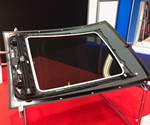Bio4self bio-based autocomposite wins JEC Innovation Award
The Bio4self consortium has developed a bio-based and easily recyclable composite material. It is suitable for mechanically demanding components in the automotive industry.
In the EU project Bio4self, an international consortium with the participation of the Fraunhofer ICT (Pfinztal, Germany) and the Institute of Textile Technology of the RWTH Aachen, has developed a self-reinforced composite of polyactide (PLA). PLA materials are based on lactic acids, which can be obtained from agricultural waste or specially grown raw materials such as sugar cane. In the project, scientists combined two different PLA types with different melting temperatures into a self-reinforced PLA composite (PLA SRPC) so that the higher melting PLA is embedded as the reinforcing fiber in the lower melting matrix.
The resulting material stiffness can compete with commercially available self-reinforced polypropylene (PP) composite materials. The composites are designed for high mechanical strength and rigidity as well as high temperature and hydrolytic stability. In addition, it is fully bio-based, easily recyclable, formable and industrially biodegradable. As the first prototypical applications of the material, the partners present a hybrid seating structure.
This project was awarded a JEC Innovation Award for sustainability, announced at the JEC Innovation Award ceremony on March 12, 2019.
This post is courtesy of the CompositesWorld and Springer lightweight.design magazine media partnership. For more information about Springer and lightweight.design, go to https://www.springerprofessional.de/en/link/12141380
Related Content
-
Optimizing a thermoplastic composite helicopter door hinge
9T Labs used Additive Fusion Technology to iterate CFRTP designs, fully exploit continuous fiber printing and outperform stainless steel and black metal designs in failure load and weight.
-
MFFD thermoplastic floor beams — OOA consolidation for next-gen TPC aerostructures
GKN Fokker and Mikrosam develop AFP for the Multifunctional Fuselage Demonstrator’s floor beams and OOA consolidation of 6-meter spars for TPC rudders, elevators and tails.
-
JEC World 2024 highlights: Thermoplastic composites, CMC and novel processes
CW senior technical editor Ginger Gardiner discusses some of the developments and demonstrators shown at the industry’s largest composites exhibition and conference.












